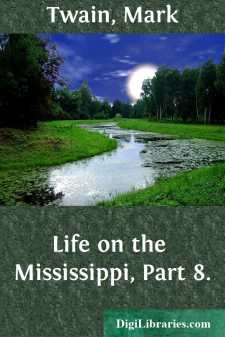Biography & Autobiography
- Adventurers & Explorers 15
- Artists, Architects, Photographers 16
- Business 2
- Composers & Musicians 14
- Criminals & Outlaws 5
- Editors, Journalists, Publishers 6
- Educators 1
- Entertainment & Performing Arts 3
- General 73
- Health, Exercise & Fitness 1
- Historians 3
- Historical 83
- Law Enforcement 1
- Lawyers & Judges 3
- Literary
- Medical 7
- Military 48
- Naturalists, Gardeners, Environmentalists 8
- Personal Memoirs & Diaries 226
- Philosophers 3
- Political 9
- Presidents & Heads of State 38
- Religious 38
- Rich & Famous 27
- Scientists 13
- Women 31
Literary Books
Sort by:
THE RETURN OF THE CONQUEROR It would be hard to exaggerate the stir which the newspapers and the public generally made over the homecoming of Mark Twain. He had left America, staggering under heavy obligation and set out on a pilgrimage of redemption. At the moment when this Mecca, was in view a great sorrow had befallen him and, stirred a world-wide and soul-deep tide of human sympathy. Then there had...
more...
by:
William Sharp
CHAPTER I. It must, to admirers of Browning's writings, appear singularly appropriate that so cosmopolitan a poet was born in London. It would seem as though something of that mighty complex life, so confusedly petty to the narrow vision, so grandiose and even majestic to the larger ken, had blent with his being from the first. What fitter birthplace for the poet whom a comrade has called the...
more...
by:
Stapleton Martin
ANNA SEWARD Anna Seward, a daughter of the Rev. Thomas Seward, destined to become, by universal assent, the first poetess of her day in England, was born 12th December, 1747. Her mother was Elizabeth, one of the three daughters of the Rev. John Hunter (who was in 1704 appointed Head Master of Lichfield Grammar School), by his first wife, Miss Norton, a daughter of Edward Norton, of Warwick, and...
more...
CHAPTER 1. Causes of Bonaparte's animosity against me. It is not with the view of occupying the public attention with what relates to myself, that I have determined to relate the circumstances of my ten years' exile; the miseries which I have endured, however bitterly I may have felt them, are so trifling in the midst of the public calamities of which we are witnesses, that I should be...
more...
MARK TWAIN AT FORTY In conversation with John Hay, Hay said to Clemens: "A man reaches the zenith at forty, the top of the hill. From that time forward he begins to descend. If you have any great undertaking ahead, begin it now. You will never be so capable again." Of course this was only a theory of Hay's, a rule where rules do not apply, where in the end the problem resolves itself into...
more...
by:
Mark Twain
Chapter 36 The Professor's Yarn IT was in the early days. I was not a college professor then. I was a humble-minded young land-surveyor, with the world before me—to survey, in case anybody wanted it done. I had a contract to survey a route for a great mining-ditch in California, and I was on my way thither, by sea—a three or four weeks' voyage. There were a good many passengers, but I had...
more...
PREFACE The substance of "A Poor Man's House" was first recorded in a journal, kept for purposes of fiction, and in letters to one of the friends to whom the book is dedicated. Fiction, however, showed itself an inappropriate medium. I was unwilling to cut about the material, to modify the characters, in order to meet the exigencies of plot, form, and so on. I felt that the life and the...
more...
by:
Sasi Kumar Hesh
MY REMINISCENCES I know not who paints the pictures on memory's canvas; but whoever he may be, what he is painting are pictures; by which I mean that he is not there with his brush simply to make a faithful copy of all that is happening. He takes in and leaves out according to his taste. He makes many a big thing small and small thing big. He has no compunction in putting into the background that...
more...
by:
William Tuckwell
STRUGGLE Quintus Horatius Flaccus, the "old popular Horace" of Tennyson, petted and loved, by Frenchmen and Englishmen especially, above all the poets of antiquity, was born on 8th December, B.C. 65. He calls himself in his poems by the three names indifferently, but to us he is known only by the affectionate diminutive of his second or gentile name, borne by his father, according to the...
more...
THE LIVES OF THE POETS * * * * * EUSTACE BUDGELL, Esq; was the eldest son of Gilbert Budgell, D.D. of St. Thomas near Exeter, by his first wife Mary, the only daughter of Dr. William Gulston, bishop of Bristol; whose sister Jane married dean Addison, and was mother to the famous Mr. Addison the secretary of state. This family of Budgell is very old, and has been settled, and known in Devonshire above...
more...











